Tulsi, Rama — Rama Tulsi, Holy Basil (Ocimum tenuiflorum) seeds, organic
Price range: $4.95 through $29.55
Syn. Ocimum sanctum
Family: Mint (Lamiaceae)
Hardy to Zones 10 to 12, otherwise grown as a summer annual 60 days to harvest, or a potted plant brought in for the winter
(Rama Tulsi*, Tulasi, Holy Basil) Perennial bush basil originally from India–the main type grown there. These seeds are from plants grown at our farm, secluded from other basils, here in the USA. The plants are purple stemmed with green leaves, sometimes tinted in purple, open form to 4 feet, flowers reddish purple. Highly aromatic plant, testing high in both eugenol and rosmarinic acid. Traditional usage (Ayurveda): stress, anxiety, heart disease, arthritis, diabetes, and dementia. Drinking tulsi tea in the morning is a fantastic way to get started. Plant tulsi seeds in the spring. Hold seeds in the palm of your hand in the direct sunlight before planting, and plant in such a way that the seeds still receive light in the pot or flat. Scatter seeds on surface, then press in and keep evenly moist, in strong light and very warm until germination, which is rapid. Transplant or thin to 2 feet apart.
Packet contains 50 seeds
1 g contains ~2,000 seeds
5 g contains ~10,000 seeds
10 g contains ~20,000 seeds
Certified Organically Grown
*for a discussion of morphological variability of tulsi in India, see the research article by Malay, Pandey, Bhatt, Krishnan and Bisht “Morphological variability in holy basil (Ocimum tenuiflorum) from India,” Genet Resour Crop Evol (2015) 62:1245-1256.
Please note: We performed chromatographic analysis of the Amrita and the Rama cultivar and found them to be virtually identical. This plant and its seeds are now sold by us under the adage “Rama Tulsi.”

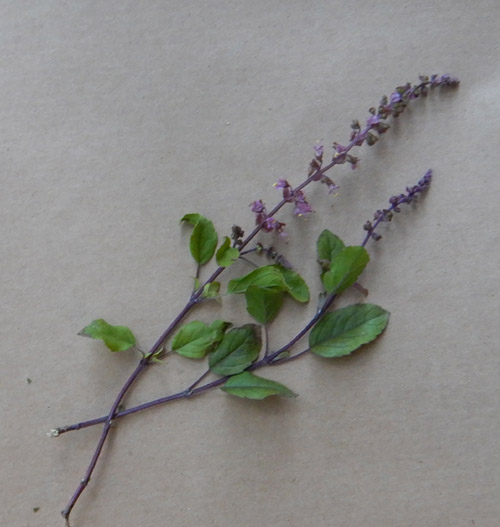
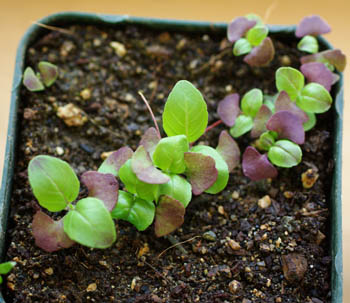
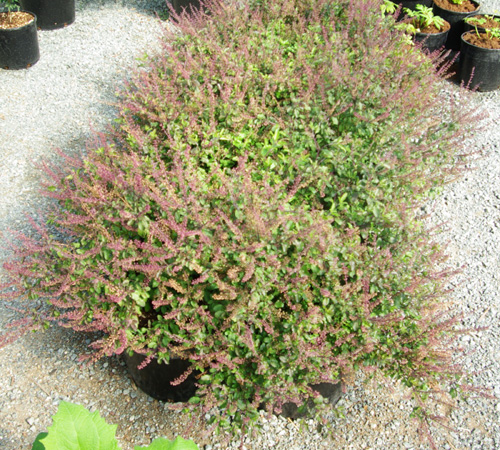
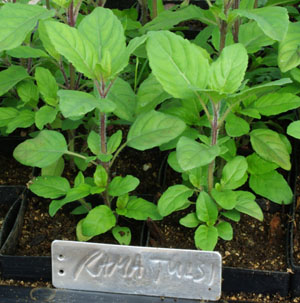
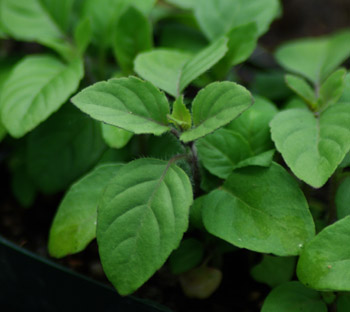



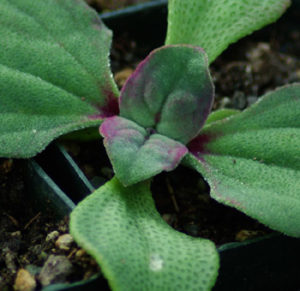
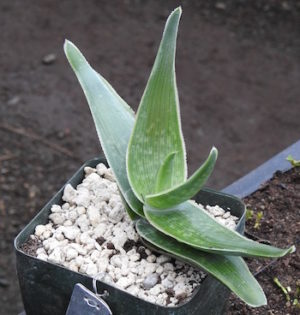
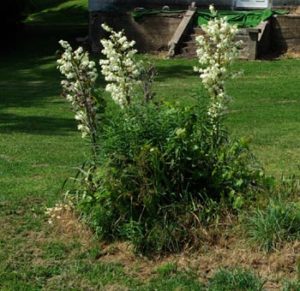
Question
Lynn (verified owner) –
The different types of tulsi I would need to keep them separated also if I wanted seeds from them , right ?
Upvote if this was helpful (0) Downvote if this was not helpful (0) Watch Unwatch Flag for removal
Richo Cech –
Hi Lynn, Yes, you are right. Besides isolation, as outcrossers, many individuals need to be grown to assure genetic stability. I normally encourage gardeners to save their own seed but I do think tulsi is an exception–I encourage you to get your seed from us on a yearly basis to assure integrity. All the best, richo
Upvote if this was helpful (3) Downvote if this was not helpful (0) Flag for removal
Question
Lynn (verified owner) –
How far do I need to plant tulsi from other basils ? thank you .
Upvote if this was helpful (0) Downvote if this was not helpful (0) Watch Unwatch Flag for removal
Richo Cech –
Hi Lynn, Thanks for writing. If planting for tea use or eating, the various types can be separated by 2 feet. If planning to save seed, just grow one type a year, or separate with biological boundaries (trees, ravines, at least 4 rows of different herbs, etc) or a distance of 50 feet. Richo
Upvote if this was helpful (2) Downvote if this was not helpful (0) Flag for removal
Question
Somer Wilkinson –
Is it necessary to dry the flowers/leaves before making into tea or can they be used fresh?
Upvote if this was helpful (0) Downvote if this was not helpful (0) Watch Unwatch Flag for removal
Richo Cech –
Hello Somer, It isn’t necessary, but it is advised. By drying the herb you render the cell structure brittle, so that when the hot water inundates the herb, extraction is complete. richo
Upvote if this was helpful (19) Downvote if this was not helpful (0) Flag for removal
Ian Moore (verified owner) –
When would you direct sow? I live in humboldt County northern CA along coast. I did this last year and lost almost all to extensive rain. Thanks, om
Upvote if this was helpful (0) Downvote if this was not helpful (0) Flag for removal
Richo Cech –
Hello Ian,
We don’t really recommend direct-seeding Ocimum tenuiflorum unless you’re in the tropics. One thing I might mention is that in midsummer when the plants shatter their first seeds on the hot soil, the reprod can be immediate and healthy. But that’s a bit late in the season to develop a harvestable plant. These are to be started from now through April, indoors, preferably under lights, in cells, to achieve the largest plant before transplant in May or June.
Richo
Upvote if this was helpful (1) Downvote if this was not helpful (1) Flag for removal
Ian (verified owner) –
OK I watched a video of you talking about direct sowing tulsi in an interview. Was that the Krishna tulsi you were talking about? Thanks
Upvote if this was helpful (0) Downvote if this was not helpful (0) Flag for removal
Richo Cech –
Hello Ian, OK, thank for orienting me, that was the temperate tulsi (Ocimum africanum) that can easily be direct-seeded in the spring and is available in bulk sizes for doing so. richo
Upvote if this was helpful (9) Downvote if this was not helpful (0) Flag for removal
pat –
would this grow in a tropical dessert climate, on a Caribbean island? also interested in planting ashwaganda and scullcap.
Upvote if this was helpful (0) Downvote if this was not helpful (0) Flag for removal
Richo Cech –
Hi Pat, Yes, tulsi is a standard plant in the tropics. Ashwagandha does well with sand and sun. Skullcap is more of a temperate plant, it would require a rich soil and shade. richo
Upvote if this was helpful (9) Downvote if this was not helpful (0) Flag for removal
louiekahmeng1965 –
will the new crop be available October 2022?
Upvote if this was helpful (0) Downvote if this was not helpful (0) Watch Unwatch Flag for removal
Richo Cech –
hi louie, we’re already harvesting new crop tulasi. October is a good guess for getting in on the fresh crop. Last year’s is still giving high rates of germ, though, it is almost a moot concern. richo
Upvote if this was helpful (0) Downvote if this was not helpful (0) Flag for removal
Question
Trudy –
Is the Ocimum sanctum the same as Ocimum tenuiflorum?
Upvote if this was helpful (0) Downvote if this was not helpful (0) Watch Unwatch Flag for removal
Richo Cech –
hi trudy, its muddled. Ocimum sanctum is an outdated scientific name for Ocimum tenuiflorum that has been misused for naming Ocimum africanum. richo
Upvote if this was helpful (9) Downvote if this was not helpful (0) Flag for removal
Question
Michael –
If im growing this in pots,what type of soil/soil mix do I need? Ill be growing it to use for tea
Upvote if this was helpful (0) Downvote if this was not helpful (0) Watch Unwatch Flag for removal
Richo Cech –
Hi Micheal, Standard potting soil will work fine. Tulsi needs LIGHT to germinate and likes plenty of NUTRIENTS to grow. Richo
Upvote if this was helpful (3) Downvote if this was not helpful (0) Flag for removal
George Heston (verified owner) –
Do you cut it back all season. How short to the ground do you trim it?
Upvote if this was helpful (0) Downvote if this was not helpful (0) Flag for removal
Richo Cech –
yes, we cut back only 1/3 of the way down and this helps immensely. r
Upvote if this was helpful (9) Downvote if this was not helpful (0) Flag for removal